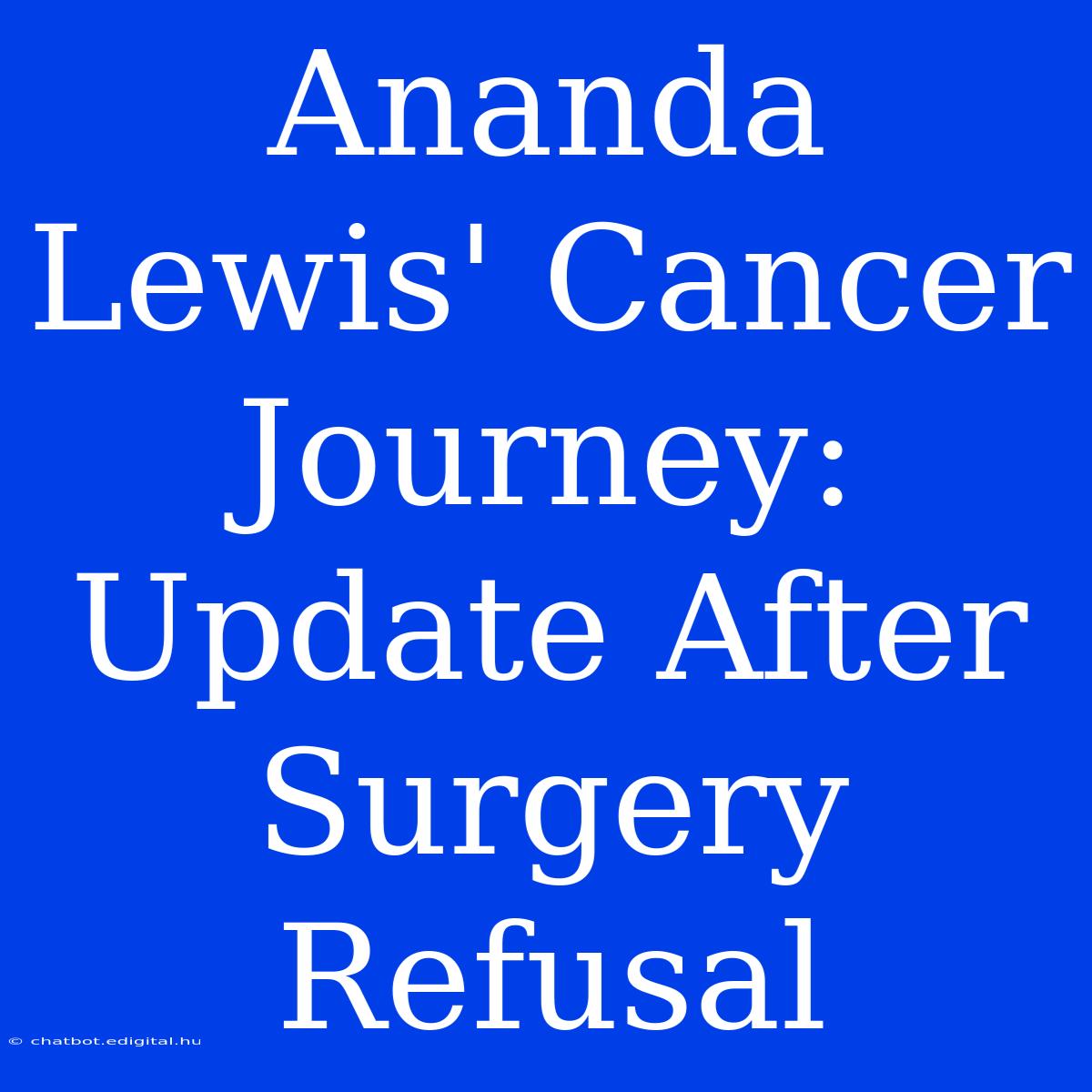Ananda Lewis' Cancer Journey: Update After Surgery Refusal - A Story of Resilience and Choice
Can a diagnosis like cancer truly be overcome through alternative methods? Ananda Lewis' recent update after refusing surgery for her diagnosis has sparked conversations about navigating the complexities of medical choices. This article examines the intricacies of Lewis' journey, exploring her reasons for choosing a non-traditional path and analyzing the implications of her choice.
Editor's Note: This article examines Ananda Lewis' cancer journey following her public announcement of refusing surgery. It is important to note that every individual's experience with cancer is unique, and medical decisions should be made in consultation with a qualified healthcare professional.
The news of Lewis' diagnosis prompted a surge of concern and support from her fans and the entertainment community. However, her decision to forgo surgery and pursue alternative therapies has generated mixed reactions and raised critical questions about medical autonomy and the role of personal choice in cancer treatment.
Analysis: This article aims to provide a comprehensive review of Lewis' journey, exploring the multifaceted nature of her choice. It delves into the reasons behind her decision, examining the evidence supporting alternative therapies, and analyzing the potential risks and benefits involved.
Key Takeaways:
| Aspect | Description |
|---|---|
| Medical Autonomy | The right of patients to make informed decisions about their health and treatment. |
| Alternative Therapies | Non-conventional methods of treatment that may complement or replace traditional medical care. |
| Evidence-Based Medicine | Medical practices supported by rigorous scientific research and clinical trials. |
| Patient-Doctor Relationship | The importance of open communication, shared decision-making, and trust between patients and their healthcare providers. |
Ananda Lewis' Cancer Journey
Understanding the Decision:
- Medical Autonomy: Lewis' decision reflects the fundamental right of individuals to make informed choices about their health. The choice to seek alternative therapies reflects a deep commitment to personal autonomy.
- Alternative Therapies: Alternative therapies encompass a wide range of practices, including dietary changes, herbal medicine, and complementary therapies like acupuncture and massage. Lewis' choice reflects a desire for holistic healing and a potential distrust of conventional medicine.
- Evidence-Based Medicine: While alternative therapies offer a range of benefits, it is crucial to recognize that many lack strong scientific evidence to support their efficacy in treating cancer. This necessitates careful consideration of potential risks and benefits alongside established medical treatments.
Potential Risks and Benefits:
- Risks: The potential risks of refusing surgery can vary based on the specific type and stage of cancer. It is essential to consult with a qualified healthcare professional to weigh the risks and benefits of all treatment options.
- Benefits: Alternative therapies may offer symptom relief, improved quality of life, and a sense of empowerment. However, it is essential to remember that alternative therapies are not a replacement for conventional medical care.
The Role of the Patient-Doctor Relationship:
- Communication: Lewis' decision highlights the crucial role of open communication between patients and their doctors. A strong patient-doctor relationship fosters trust and enables informed decision-making.
- Shared Decision-Making: Shared decision-making empowers patients to actively participate in their care, leading to better outcomes and higher patient satisfaction.
The Ongoing Conversation:
Ananda Lewis' journey continues to raise important questions about medical choices, highlighting the need for open dialogue and greater awareness of the benefits and risks associated with both traditional and alternative approaches to cancer treatment.
FAQ
Q: Are alternative therapies effective in treating cancer?
A: The effectiveness of alternative therapies in treating cancer is a complex and debated topic. Some therapies may offer symptom relief or improve quality of life, but there is limited scientific evidence to support their efficacy in curing cancer. It is crucial to consult with a healthcare professional to discuss the potential benefits and risks of specific therapies.
Q: Is it safe to refuse surgery for cancer?
A: The safety of refusing surgery depends on the specific type and stage of cancer. It is essential to have an open and honest discussion with a qualified oncologist to weigh the risks and benefits of all treatment options.
Q: What are some examples of alternative therapies for cancer?
A: Some examples of alternative therapies used for cancer include dietary changes, herbal medicine, acupuncture, and massage therapy.
Q: How can I make informed decisions about my cancer treatment?
A: It is essential to engage in open communication with your doctor, ask questions, and understand the risks and benefits of all treatment options.
Tips for Navigating a Cancer Diagnosis
- Seek multiple opinions: Consult with different medical professionals to gain a broader understanding of your options.
- Ask questions: Don't hesitate to ask your doctor any questions you have about your diagnosis, treatment options, and potential side effects.
- Consider alternative therapies: Explore complementary therapies like acupuncture, massage, or herbal medicine, but always discuss them with your doctor.
- Join support groups: Connect with others who have faced similar challenges for emotional support and practical advice.
- Prioritize self-care: Focus on activities that bring you joy and help manage stress.
Summary
Ananda Lewis' cancer journey serves as a reminder of the complexities of medical choices and the power of personal autonomy. While her decision to refuse surgery and embrace alternative therapies is a personal choice, it underscores the need for a collaborative approach to cancer treatment that considers both conventional medicine and complementary therapies.
Closing Message:
Lewis' journey invites reflection on the importance of patient-doctor relationships, the role of evidence-based medicine, and the ever-evolving landscape of cancer treatment. The story encourages open dialogue and a deeper understanding of the intricate balance between medical advancements and personal choices in navigating a challenging journey.

